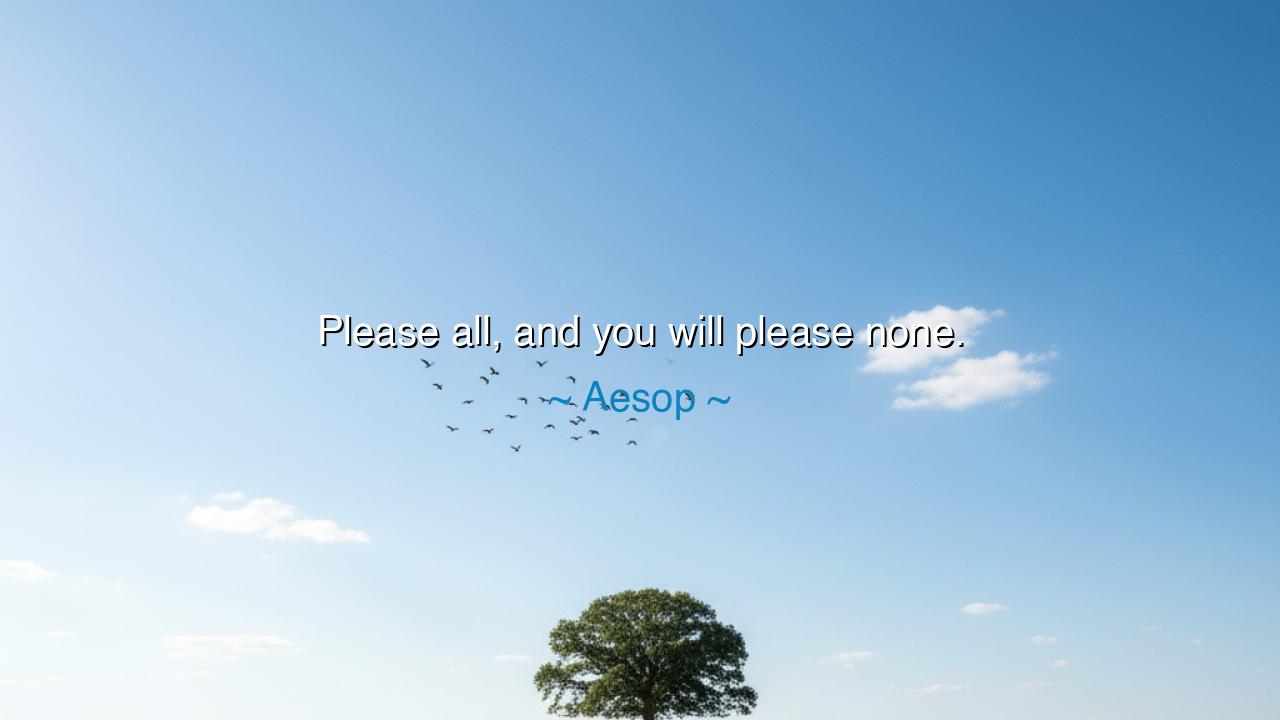
Please all, and you will please none.






To please all is to walk an impossible path, for the desires of men are as countless and conflicting as the stars in the night sky. When Aesop, the ancient teller of fables, declared, “Please all, and you will please none,” he revealed a truth as old as humanity itself: one who seeks to satisfy everyone will find himself torn apart, losing both his purpose and his honor. True strength lies not in universal approval, but in the courage to stand firm in what is right, even when it brings criticism.
This wisdom comes to us through one of Aesop’s most well-known fables, “The Man, the Boy, and the Donkey.” In this tale, a man and his son set out on a journey with their donkey. At first, they both walk beside the animal, but passersby laugh at their foolishness for not riding it. Wanting to please them, the man places the boy on the donkey. Soon, others scold the boy for making his father walk, so the man rides instead. Still later, more travelers accuse them of cruelty for overworking the donkey, so in desperation, both father and son climb onto its back. Finally, criticized once again, they attempt to carry the donkey themselves, and in their struggle, the animal falls into a river and is lost. By trying to please everyone, they please no one and end in disaster.
History offers examples of leaders who faltered because they sought universal approval. In the final days of the Roman Republic, certain senators, eager to appease both the people and the aristocracy, compromised endlessly, losing the trust of all sides. Their weakness created a vacuum into which men like Julius Caesar stepped, reshaping Rome through decisive action. Those who seek to please everyone often achieve nothing, for indecision is as dangerous as outright failure.
In contrast, the greatest leaders have chosen principle over popularity. Abraham Lincoln, during the American Civil War, faced tremendous pressure from all sides—some urged him to end slavery immediately, others demanded he protect it. Had he tried to appease both factions, the Union would have splintered beyond repair. Instead, Lincoln acted with resolve, guided by his vision of a free and united nation. Though reviled by many during his lifetime, his steadfastness earned him enduring honor.
On a personal level, this teaching speaks to the struggles of everyday life. A person who bends constantly to the expectations of others will lose their true self, like a tree swaying wildly in every direction until its roots are torn free. To please none is the fate of one who has no convictions of their own. By standing firm in one’s values, even amidst criticism, a person discovers authenticity and inner peace.
Let this lesson be passed to all generations: it is better to displease many by doing what is right, than to seek the hollow praise of all by doing nothing. As Aesop teaches, the path to greatness lies not in universal approval, but in truth, integrity, and the courage to walk one’s chosen road, even if the crowd jeers along the way.






LNLinh Ngoc
Ethically, there’s nuance. Sometimes accommodating many perspectives reduces harm in plural societies; other times it betrays the people most affected. How can we tell the difference? I’d value a decision matrix: stakes for the least powerful, reversibility of the compromise, clarity of accountability, and whether the outcome still advances the core principle rather than merely quieting noise. Please suggest two case-style thought experiments—one where compromise improves legitimacy, one where it corrodes trust—so we can practice distinguishing humane breadth from hollow consensus.
TNPham thi thanh ngan
Online, the pressure to broaden appeal is algorithmic. Chasing likes can flatten voice until posts are forgettable. Could you propose a depth-first dashboard that counterweights vanity reach: saves, shares with commentary, average watch/read completion, and meaningful replies from target communities? I’d also like a cadence—one experiment aimed at resonance with a niche, one aimed at discovery—so we compare quality of engagement, not just volume. What’s the signal that we’re diluting: higher impressions, lower retention, and comments that say “nice!” but never return?
NDNguyen Duy
In leadership, big tents can collapse under the weight of universal satisfaction. How do we practice inclusion without turning strategy into mush? I’m seeking a playbook: predeclare decision criteria and explicit non-goals, invite dissent through a rotating red team, and then use “disagree-and-commit” with a time-boxed review. When backlash arrives, what evidence should trigger adjustment versus holding the line—leading indicators tied to outcomes, feedback from frontline implementers, or risk thresholds crossing pre-set guardrails? I want mechanisms that honor voices while preserving direction.
TLtruong thi thuy linh
For communicators, the temptation to dilute is real. Trying to offend no one often yields sentences that say nothing. How do we keep clarity and care together? I’d love a drafting exercise: write the sharp claim, then add a fairness paragraph that names the strongest counterpoint, followed by a concrete example that grounds the stance in lived reality. What’s a checklist for the final pass—does each paragraph contain a point, a reason, and an image? Where can we accept principled disagreement rather than hedging into beige?
QAHoang Quynh Anh
Personally, this feels like a boundary check. Chronic appeasing can look like kindness while quietly erasing the self. What signals separate generosity from self-abandonment—resentment spikes, vague commitments, or a calendar packed with obligations that don’t reflect my values? I’d appreciate two ready-made scripts for saying a warm “no,” plus a five-minute weekly audit: list the yeses I regret, reconnect to my top three priorities, and schedule one small act that delights me even if it disappoints someone else. How do we repair relationships after we stop over-giving?